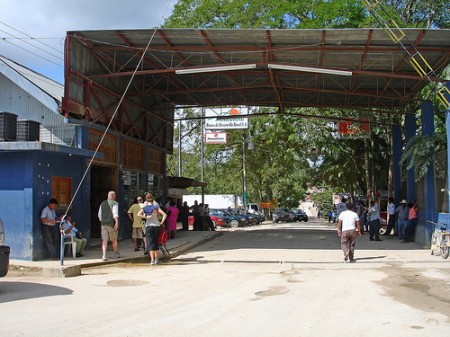
The late twentieth century saw a wave of democratic transitions in Latin America and Eastern Europe. After the fall of the Soviet Union, the former Soviet republics became independent states in their own right, while countries in Latin America began to break away from their colonial pasts, as well as from the dictatorships and civil wars that followed independence in the 19th century. While Huntington’s famous ‘third wave’ of democracy saw the emergence of democratic structures in previously autocratic regimes, unresolved territorial claims, border disputes and questions surrounding the relationship between self-determination and sovereignty continue to affect regional security in Latin America today.
Guatemala and Belize are two countries that have been embroiled in a territorial dispute over land and maritime boundaries since the 19th century. Guatemala once claimed all of modern-day Belize (which it borders to the Northeast) as its territory, but today restricts its claims to the southern half of the country and its islands.
After decades of negotiations between the countries had failed to resolve the dispute, the Organization of American States (OAS) (under whose auspices the negotiations had been held) suggested in 2008 that the case be referred to the International Court of Justice in The Hague for independent arbitration.
A year from now, on 6 October 2013, a referendum will be held in both Guatemala and Belize to come to a decision about the referral. ICJ rulings on these so-called “contentious issues” are binding for the states that submit cases to the court.
Guatemala’s land and maritime claims date back to the two countries’ colonial pasts when Guatemala was a Spanish colony and Belize was controlled by the British who formally incorporated it as a crown colony, under the name “British Honduras,” in 1862.
Guatemala argues that it inherited imperial Spain’s territorial rights to Belize upon independence in 1821. As one of the countries west of the ‘Line of Demarcation’ established in the 1494 Treaty of Tordesillas (which apportioned all “New World” territories either to Spain or Portugal), Belize fell to Spain and was only later settled by British and Scottish Baymen in disregard of the treaty.
Following the doctrine of uti possidetis, Guatemala’s claims rest on these rights “inherited” from Spain as well as on Article 7 of the so-called Guatemalan Treaty of 1859, which (allegedly) stipulates that Guatemala recognized Belize only in exchange for the construction of a road from Guatemala City to the Atlantic. Eighty years later, Guatemala declared the treaty void, in light of Britain’s failure to meet its treaty obligations, and claimed Belize’s territory in its entirety. Belize, on the other hand, bases its claims on its rights to territorial integrity and self-determination in customary international law, pointing to the longstanding presence of British and Belizean governments on its soil.
Despite numerous UN resolutions calling for Belize’s territorial integrity to be respected, following accusations of Guatemalan neo-colonialism by Belize’s multi-racial population, Guatemala refused to recognize Belize’s independence in 1981 in what became known as the Heads of Agreement Crisis. In the 90s, Guatemala moved to formally recognize Belize but continued to insist on the validity of its territorial claims, which now amounted to half of the country’s territory. Ten years later, negotiations resumed, again under the auspices of the OAS, which initiated the implementation of formal Confidence-Building Measures (CBMs) along with efforts to liberalize trade and strengthen relations between the two countries. In response to an increasing number of hostile incidents at the border, the so-called ‘adjacency zone’ (which extends 1km east and west of the border line) was set up as a buffer.
With hundreds of Guatemalans crossing into Belize each day to find work, and middle class families sending their children to Belizean schools to improve their English, significant cross-border movement between the two countries has existed for years. Illegal movement, however –made possible by a porous border that Belize accuses Guatemala of failing to adequately police – poses major security problems for the region, especially in regard to drug trafficking and drug-related violence, corruption and money laundering. When so-called “campesinos” from Guatemala are caught smuggling “xate” (an ornamental plant sold in Holland and the US) across the border, they are imprisoned in Belize in conditions that have drawn accusations of human rights violations from the Guatemalan government.
Despite efforts to ease tensions between the two countries, the conflict could not be resolved, which has led the OAS to recommend that the case be submitted to an international tribunal. In 2008, both Guatemala and Belize signed the “Special Agreement to Submit Guatemala’s Territorial, Insular, and Maritime Claim to the International Court of Justice.”
If the submission of the case to the ICJ is confirmed by referenda in both countries in 2013, a final settlement of the dispute can be expected in the next few years. With international legal opinion leaning in favor of Belize and its right to territorial integrity, the hope is that a clear demarcation of the border will go some way towards resolving the issues surrounding border incursions and illegal settlements that continue to affect security in the region today.
For further information on the topic, please view the following publications from our partners:
Guatemala: Squeezed Between Crime and Impunity
In the Shadows of Globalisation: Drug Violence in Mexico and Central America
Guatemala: Drug Trafficking and Violence
For more information on issues and events that shape our world please visit the ISN’s Security Watch and Editorial Plan.

